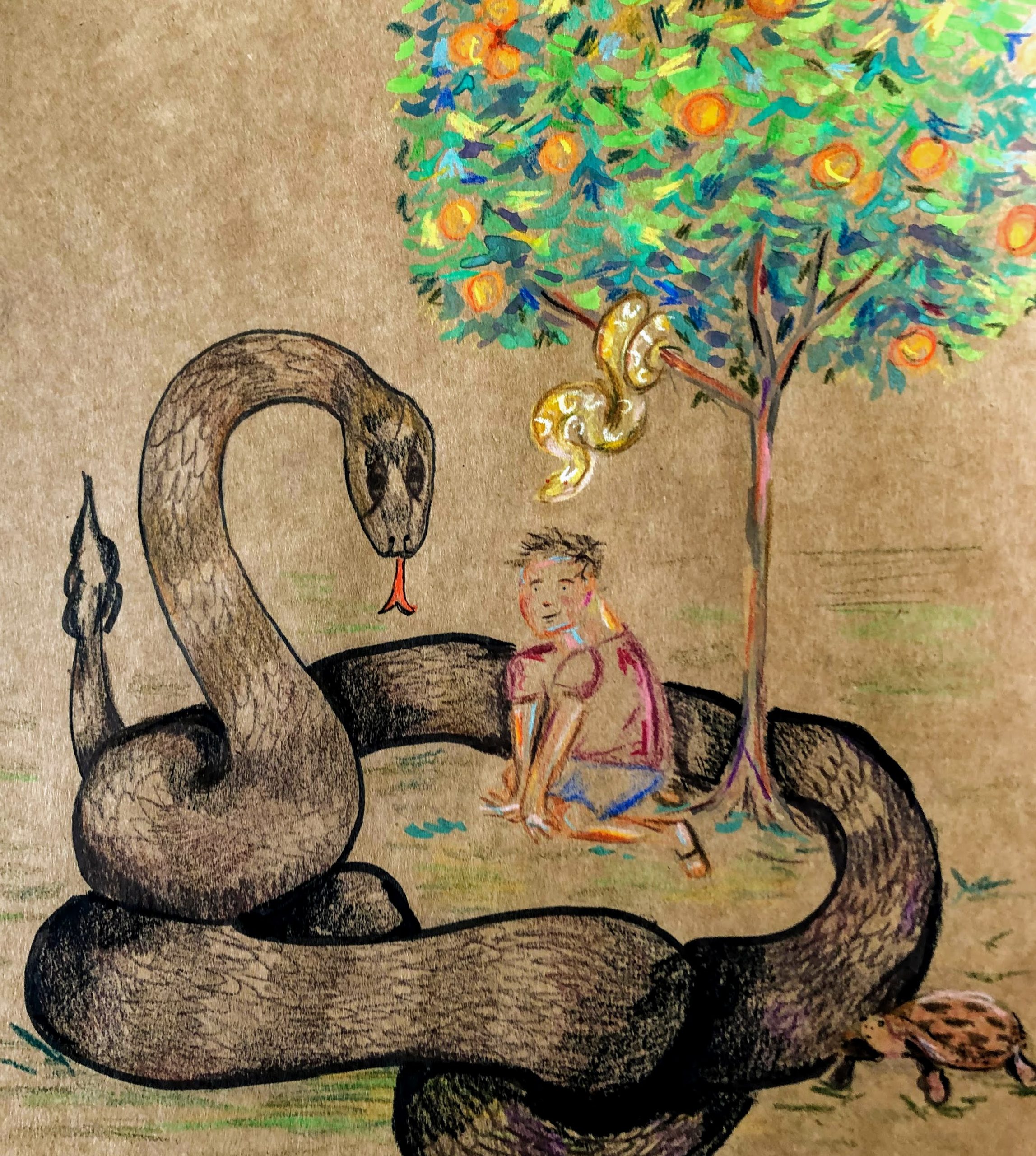
Credits: Christopher Montero, Steven Fisher – April 23, 2020
English transcription/Transcripción Española
Steven Salido Fisher, host: You’re listening to Gathering Historias, an initiative of the Arnold Arboretum.
[Music: “En las andadas” by Sílvia Tomàs Trio]
Christopher Montero: These species these trees, these plants, these birds are significant for me because this is part of my immediate reality now.
Fisher: I’m Steven Salido Fisher and I record the diverse stories of Latina and Latino people in Greater Boston. I want to celebrate their experiences in nature and capture the spirit of our presence when it comes to the world’s environment. In this story we hear from Chris. A teacher naturalist who has worked all over the world, Chris now works here at Boston at the Mass. Audubon Society. We spoke together at Jamaica Plain here at the Visitor’s Center at the Arnold Arboretum.
Chris: Hello. My name is Christopher Montero. I go by Chris Montero. I’m originally from Costa Rica and a new transplant to Massachusetts. I’ve been living in the United States for about 15 years. My background is biology but I’m also an artist. I work as a teacher naturalist for the Mass Audubon Boston Nature Center, and very excited about being part of this community now.
My mom was a single mom and we lived with my grandparents until I was around three or four. I spent out..my grandma had this one of these yards that is very common in Latin America that you see they have fruit trees, it’s a tiny yard, but they were fruit trees and they were lizards and cats of the neighbor would come and my grandma would feed the cats and she had parakeets and parrots. I spent hours and as a toddler basically just playing and catching lizards, turtle pets and my whole life I had reptiles and different creatures. I love snakes, big snake fan. A big influence with my grandpa. I think grandpa was very supportive in my interest for nature and he would give me books about wildlife.
He would take me fishing. He would show me constellations he would tell me stories about the Amazonian forest and to me as a kid that was very very powerful because it was from him from whom I heard about anacondas, piranhas, and all these type of things so. It clearly created a big mark on me. That’s why I think eventually followed my career in wildlife. When I work with students, there are so many good moments, but the general is like, sometimes to me, and I will say this sometimes for me, it’s more important to learn taxonomy of birds, for instance, or plants, to have a life-changing experience, a connection with nature, a way to see nature differently and to see the bigger picture how I am part of nature. I had really beautiful experiences like being a fan of snakes, for instance of reptiles. A lot of people have a lot of preconceived ideas and fears about snakes.
I had the honor of work with students that are ophidiophobic. They are terrified a snakes just inside. They cannot even see any pictures. My grandma was like that. La probe abuela [English: My poor grandmother] where like she was terrified of snakes and she had this grandson that was always chasing snakes. Perhaps one of the most amazing memories is when I have had students that are like, oh, man, I’m not touching that thing. I’m like, hold it well. I had students that had been on the fast lane, we’re in an expedition is two-three weeks. I had a student in Belize. I remember she’s from India, and she had a very unpleasant experience in early childhood with a cobra. Anyway, long story short at the end of that traveling expedition she dared to touch a harmless snake obviously and held a snake in her hands.
She was so moved about it, is not only again the connecting moment with a snake and overcoming that fear that had been with her, she was a teenager, but her whole life that she gave me this mala, this rosary. She gave it to me like, not really, this means so much to me. I still have it. It was, like 10, 12 years ago so that was really cool. Yes, and I’m not expecting again, children in urban areas to have the possibility to become biology or naturalists always, but as long as you care as long as you remember. I think it’s very important because going back to this historic time that we are in, our civilization has grown apart separating humans from nature. This place [Arnold Arboretum and Mass Audubon Nature Center] offer that opportunity to reconnect with nature. That this is our neighborhood. This is my region. I live now in the Northeast where it’s no longer the Pacific Northwest.
Well this is my home now. These species, these trees, these plants, these birds are significant for me because this is part of my immediate reality now and my reality is even bigger, I think about the East Coast or North America now, but guess what: I have roots in Latin America and I keep opening my lens to a bigger perspective. This is our home. This is where we make our stand as a species. I know I’m meandering around but I think is important this place it reminds us that we’re not supposed to be that far away from nature.
[Music: instrumental guitar]
Fisher: Our thanks to Chris who spoke with us and shared his story. This was produced by me, Steven Salido Fisher, and supported through the Arnold Arboretum, Harvard Divinity School, and the good folks over at the Lamont Library Media Lab.
Steven Salido Fisher, anfitrión: Estás escuchando las Historias de Gathering, una iniciativa del Arnold Arboretum.
[Música: “En las andadas” por Sílvia Tomàs Trio]
Christopher Montero: Estas especies, estos árboles, estas plantas, estas aves son importantes para mí porque ahora esto es parte de mi realidad inmediata.
Fisher: Soy Steven Salido Fisher y grabo diversas historias de latinos y latinas en el Gran Boston. Quiero celebrar sus experiencias en la naturaleza y capturar el espíritu de nuestra presencia cuando se trata el medio ambiente del mundo. En esta historia escuchamos acerca de Chris. Un maestro naturalista que ha trabajado en todo el mundo, Chris ahora trabaja aquí en Boston en la Mass. Audubon Society. Hablamos juntos en Jamaica Plain aquí en el Centro de visitantes del Arnold Arboretum.
Chris: Hola. Me llamo Christopher Montero. Pero soy conocido como Chris Montero. Soy originario de Costa Rica y ahora estoy radicado en Massachusetts. He estado viviendo en los Estados Unidos por cerca de 15 años. Mi formación es en biología, pero también soy artista. Trabajo como maestro naturalista para el Centro Natural Mass Audubon en Boston, y estoy muy emocionado de ser parte de esta comunidad ahora.
Mi madre era madre soltera y vivimos con mis abuelos hasta que tuve alrededor de tres o cuatro años. Pasaba tiempo afuera…mi abuela tenía uno de esos patios que son muy comunes en América Latina, en el que puedes ver que hay árboles frutales, era un patio pequeño, pero había árboles frutales, lagartijas y venían los gatos del vecino y mi abuela los alimentaba, y tenía periquitos y loros. Pasé horas, cuando era niño, básicamente jugando; atrapaba lagartijas, tenía tortugas de mascotas y toda mi vida tuve reptiles y diferentes criaturas. Me encantan las serpientes, soy un gran fanático de las serpientes. Mi abuelo fue una gran influencia. Creo que el abuelo me apoyo mucho en mi interés por la naturaleza y me daba libros sobre la vida silvestre.
Me llevaba a pescar. Me mostraba constelaciones, me contaba historias sobre el bosque Amazónico y para mí, cuando era niño, era muy muy poderoso, porque era de él de quien escuché sobre anacondas, pirañas y todo este tipo de cosas. Claramente dejó una gran marca en mí. Pienso que es la razón por la cual seguí mi carrera en la vida silvestre. Cuando trabajo con estudiantes, hay muchos buenos momentos, pero en general es, a veces para mí, y lo diré, a veces para mí es más importante aprender la taxonomía de las aves, por ejemplo, o las plantas, para tener un experiencia que cambia la vida, una conexión con la naturaleza, una forma de ver la naturaleza de manera diferente y ver el panorama general de cómo soy parte de la naturaleza. Tuve experiencias realmente hermosas, como ser fanático de las serpientes, por ejemplo, y de los reptiles. Mucha gente tiene muchas ideas preconcebidas y temores sobre las serpientes.
Tuve el honor de trabajar con estudiantes que son ofidio fóbicos. Están aterrorizados profundamente por las serpientes. Ni siquiera pueden ver ninguna foto. Mi abuela era así. La pobre abuela [en inglés: My poor grandmother] estaba aterrorizada por las serpientes y tenía un nieto que siempre estaba persiguiendo serpientes. Quizás uno de los recuerdos más sorprendentes es cuando he tenido estudiantes que dicen, oh, hombre, no estoy tocando esa cosa. Yo dije, sostenlo bien. Tuve estudiantes que iban por el carril rápido, estaban en una expedición en dos o tres semanas. Tuve una estudiante en Belice. Recuerdo que era de la India, y tuvo una experiencia muy desagradable en la primera infancia con una cobra. De todos modos, larga historia, corta al final de esa expedición de viaje, se atrevió a tocar una serpiente inofensiva, obviamente, y sostuvo una serpiente en sus manos.
Estaba tan conmovida por eso, no sólo por el momento de conexión con una serpiente y de superar el miedo que había estado con ella, era una adolescente, por toda su vida y me dio este mala, este rosario. Ella me lo dio y significa mucho para mí. Todavía lo tengo. Fue como hace 10, 12 años, así que fue realmente genial. Sí, y no espero otra vez, los niños de las zonas urbanas tienen la posibilidad de convertirse en biólogos o naturalistas siempre, pero siempre y cuando les importe, siempre y cuando recuerden. Creo que es muy importante porque volviendo a este tiempo histórico en el que estamos, en nuestra civilización se ha separado al humano de la naturaleza. Este lugar [Arnold Arboretum y el Centro Natural Mass Audubon] ofrece esa oportunidad de reconectarse con la naturaleza. Que este es nuestro barrio. Esta es mi región. Ahora vivo en el Noreste, donde ya no es el Noroeste del Pacífico.
Bueno, esta es mi casa ahora. Estas especies, estos árboles, estas plantas, estas aves son importantes para mí porque esto es ahora parte de mi realidad inmediata y mi realidad es aún más grande, pienso en la costa este o en América del Norte ahora, pero adivina qué: tengo raíces en América Latina y yo sigo abriendo mi mente a una perspectiva más amplia. Esta es nuestra casa. Aquí es donde hacemos nuestro lugar como especie. Sé que estoy deambulando, pero creo que es importante este lugar que nos recuerda que no debemos estar tan lejos de la naturaleza.
[Música: guitarra instrumental]
Fisher: Nuestro agradecimiento a Chris que habló con nosotros y compartió su historia. Esto fue producido por mí, Steven Salido Fisher, y apoyado a través del Arnold Arboretum, la Escuela de la Divinidad de Harvard y las buena personas en el Laboratorio de Medios de la Biblioteca de Lamont.
